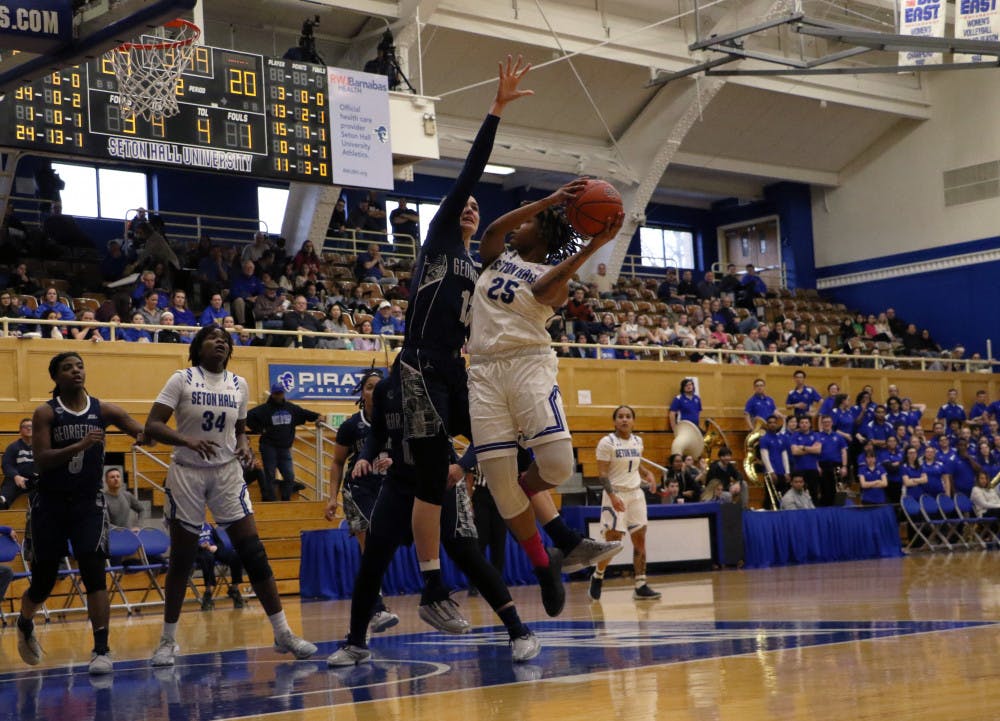[caption id="attachment_12387" align="alignnone" width="300"] © Joey Khan Photography[/caption]
For prospective medical students at Seton Hall, the first chance to take the new MCAT is approaching on Jan. 22, and the last chance to register for the test is Jan. 8.
The Medical College Admission Test (MCAT) underwent significant changes in April 2015, with added questions in more subject areas as well as a two and a half hour increase in the time given to complete it. This had been the biggest change to the test since 1991.
The Association of American Medical Colleges (AAMC) states on their website, the newest version of the MCAT consists of a four section test divided over 7 hours and 30 minutes, as opposed to the previously three-sectioned test taking about 5 hours to complete.
The AAMC website says the updated exam covers topics from areas of study including: biology, chemistry, physical science, psychology, sociology, critical analysis and reasoning skills.
Biology professor Dr. Roberta Moldow, director and chair of the Health Professions Advisory Committee, said the MCAT is another “gatekeeper exam” that prospective medical students must take.
The new test is set to affect 20 students per grade tracking premed according to an estimate from Moldow.
Moldow said students will be expected to put more effort into preparation than in the past.
Gabriel Calderon, junior premed student said, “I feel like a longer and more thorough exam will give the medical schools a better grasp of how well we are with science.”
Calderon adds that the addition of more sections allow for students to demonstrate their abilities over a wider array of subjects. He said he will be taking the MCAT during his junior year and plans on preparing using MCAT review books and MCAT prep courses.
Myles Hunter a sophomore pre-med student said, “I use a lot from what I’m learning in my classes, along with a few of the Kaplan MCAT review books to learn the concepts.”
Marisa Quevedo, sophomore pre-med student, plans on taking the MCAT in her junior year and is not as pleased with the changes, saying that the new MCAT does not so much test intelligence as it does mental stamina.
“I am very disappointed that a seven and a half hour test will be used to determine my acceptance into medical school (along with GPA)…This new MCAT will test endurance more than intelligence,” Quevedo said.
According to the College of Arts and Sciences’ (C.A.S) homepage on the Seton Hall website, the Health Professions Advising Program is available to help students and act as a resource for health professions.
William Sayegh can be reached at william.sayegh@student.shu.edu
© Joey Khan Photography[/caption]
For prospective medical students at Seton Hall, the first chance to take the new MCAT is approaching on Jan. 22, and the last chance to register for the test is Jan. 8.
The Medical College Admission Test (MCAT) underwent significant changes in April 2015, with added questions in more subject areas as well as a two and a half hour increase in the time given to complete it. This had been the biggest change to the test since 1991.
The Association of American Medical Colleges (AAMC) states on their website, the newest version of the MCAT consists of a four section test divided over 7 hours and 30 minutes, as opposed to the previously three-sectioned test taking about 5 hours to complete.
The AAMC website says the updated exam covers topics from areas of study including: biology, chemistry, physical science, psychology, sociology, critical analysis and reasoning skills.
Biology professor Dr. Roberta Moldow, director and chair of the Health Professions Advisory Committee, said the MCAT is another “gatekeeper exam” that prospective medical students must take.
The new test is set to affect 20 students per grade tracking premed according to an estimate from Moldow.
Moldow said students will be expected to put more effort into preparation than in the past.
Gabriel Calderon, junior premed student said, “I feel like a longer and more thorough exam will give the medical schools a better grasp of how well we are with science.”
Calderon adds that the addition of more sections allow for students to demonstrate their abilities over a wider array of subjects. He said he will be taking the MCAT during his junior year and plans on preparing using MCAT review books and MCAT prep courses.
Myles Hunter a sophomore pre-med student said, “I use a lot from what I’m learning in my classes, along with a few of the Kaplan MCAT review books to learn the concepts.”
Marisa Quevedo, sophomore pre-med student, plans on taking the MCAT in her junior year and is not as pleased with the changes, saying that the new MCAT does not so much test intelligence as it does mental stamina.
“I am very disappointed that a seven and a half hour test will be used to determine my acceptance into medical school (along with GPA)…This new MCAT will test endurance more than intelligence,” Quevedo said.
According to the College of Arts and Sciences’ (C.A.S) homepage on the Seton Hall website, the Health Professions Advising Program is available to help students and act as a resource for health professions.
William Sayegh can be reached at william.sayegh@student.shu.edu





